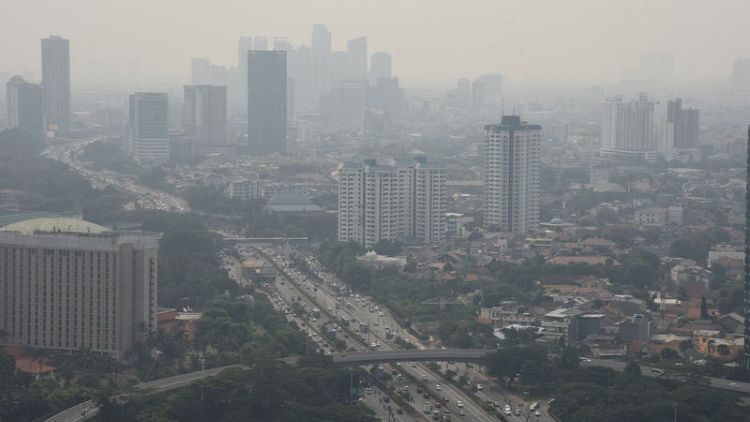By Gayatri Suroyo and Jessica Damiana
JAKARTA (Reuters) - Indonesia's capital announced new curbs on private cars on Wednesday as it moves to rein in Jakarta's choking air pollution, but experts warned the measures were unlikely to stamp out the problem.
The traffic-clogged city has more than 10 million residents, but about three times that number live in surrounding towns, swelling emissions from vehicles, factories and power stations.
In the current dry season, Jakarta has consistently ranked among the world's most polluted cities, based on data from Air Visual, a Swiss-based group that monitors air quality.
In 2016, the municipal government ordered curbs on private cars governed by whether their license-plate numbers were odd or even, to reduce traffic jams on main thoroughfares. That effort was widened last year, ahead of the Asian Games.
On Wednesday, it said this policy would be extended again to cover smaller roads.
This move comes after an instruction last week by Jakarta Governor Anies Baswedan to levy congestion charges for cars from 2020, set an age limit of 10 years on vehicles on the road by 2025, tighten emission tests and rein in industrial discharges.
However, experts said the governor needed to do more.
"All the steps taken will in themselves improve the air quality, but the overall impact will not be big because they are not addressing the main problem," said Almo Pradana, senior manager for energy and climate at the World Resources Institute Indonesia.
Pradana added that Jakarta did not have enough monitoring devices to pinpoint the cause of the pollution spikes.
"If we look at air quality issues, what you have to do is you have to find what makes the air quality worsen, how much in percentages comes from transportation, and when, and how much comes from coal power plants and factories," he said.
A strategic plan to cut pollution based on an inventory of emissions would be a better solution, he said, adding that this week's massive power outage had made the city's air cleaner.
But ending the city's love affair with cars appears likely to be difficult.
Jakarta residents took to social media on Wednesday to figure out how to get around the restrictions, including strategies such as changing car plates and buying more cars.
"It's a burden for people, not effective!" one of them, Tito Pangesti, said on Twitter.
"Make better regulations, like banning old minibus with black exhaust smoke on the street ... if you want to reduce pollution, odd-even is not a solution."
Environmental groups have sued President Joko Widodo and several government officials over Jakarta's worsening air quality, trying to force the government to investigate the source of emissions.
(Additional reporting by Tabita Diela; Editing by Ed Davies and Clarence Fernandez)
